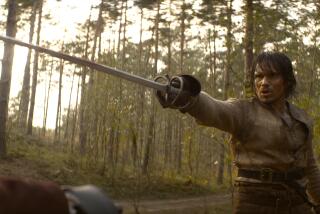Movie review: ‘Micmacs’
- Share via
“Micmacs” is a whimsical whirligig of a movie filled with salvaged metal and salvaged lives, where a bullet to the brain brings insight and a bunch of clever misfits bring a couple of weapons-making giants to their knees. What fun.
This good-versus-evil fable soon reveals itself to be a wide-ranging philosophical playground for French filmmaker Jean-Pierre Jeunet as he settles into a Paris junkyard where discards, human and otherwise, find a second life.
Bazil (the wonderful Dany Boon) is our hero. Orphaned when his father was blown to bits by a land mine, he’s grown up to be a video store clerk content to pass the time watching classic films. A stray bullet from a drive-by changes everything. Removing it from Bazil’s brain box, as someone puts it, would turn him into a vegetable, and so it stays. In short order, he is discharged by the doctor, then his boss, then left waiting to see if the bullet will eventually discharge him too.
Both Bazil and his world are infused with a surreal circus quality to start with, but that sensibility grows sharper when he’s taken in by a collection of freaks who make their home in the scrap yard. In Paris, even the dumps are beautiful. There’s a contortionist (Julie Ferrier) who folds herself up in the fridge when she needs to get away from it all and a cannonball man (Dominique Pinon) still pining to make the Guinness Book. There are seven in all, as Jeunet says he was reminded of Snow White’s Seven Dwarfs.
That sort of quirky brilliance is in much of Jeunet’s work and it is very much at play here. Like the delightful “Amélie,” what he and longtime screenwriting collaborator Guillaume Laurant have created in “Micmacs” is unexpected charm, with irony rich like candy and worth savoring along with the surprise. When Bazil happens upon a street occupied by the company that made the land mine that killed his father, the conglomerate responsible for the bullet that penetrated his brain turns out to be right across the way. That something must be done to stop the killing and the maiming is a given, and that is where the movie spends much of its time.
Though the issue of the arms race and the devastation it leaves behind is a loaded one, the comedy style, liberally plucked from the silent era, keeps things light enough and broad enough that any serious contemplating should be saved for later. Jeunet understands the enjoyment to be had from watching the underdog pull the rug out from under the big guys and he lets Bazil do that again and again.
With his mournfully pliable face and clownish physicality, Boon is perfect for the task, bumbling his way along in Chaplin-esque fashion so that dialogue often becomes completely unnecessary. When it is, Jeunet and Laurant have fun with it and, thankfully, little is lost in translation.
As much sheer pleasure as there is to this comeuppance story, the look of the film pulls more than its weight in layering in context. Created by production designer Aline Bonetto — like most of the crew, another long-timer in Jeunet’s creative collective — it is strangely beautiful with its pastiche of metal scraps filled with artistic possibility, a dancing marionette mouse made of found parts for one. There’s a sepia tone to this Paris that, coupled with the postcard-care taken in framing it by director of photography Tetsuo Nagata, makes this modern-day tale feel as if it is parading around in ‘40s vintage wear.
The filmmaker has said he was influenced by Pixar’s “Toy Story” in devising the characters, but then you could spend all day sorting through the cinematic influences Jeunet has woven into the film, from Sergio Leone’s stark western showdowns to the musical style of “The Big Sleep.” But whatever the influences, “Micmacs” is ultimately shaped by Jeunet’s unique creative vision — a fun house of mirrors that is lovely to get lost in.
More to Read
Only good movies
Get the Indie Focus newsletter, Mark Olsen's weekly guide to the world of cinema.
You may occasionally receive promotional content from the Los Angeles Times.










